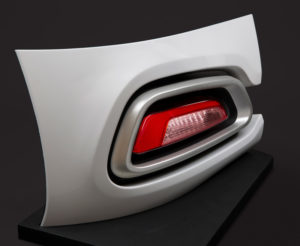by Alessandro Buson
CNC machining is a solid choice for high-quality metal and plastic parts that require the greatest degree of dimensional accuracy, critical surface finishes, and material specific properties.
The possibility to use definitive materials allows customers to test and validate their prototypes before moving into serial production. The possibility to test these same materials without the need to produce a mold reduces costs and development time, which is crucial for the automotive industry.
In this post, we will review 2 scenarios where CNC-machined parts are a valuable option:
- Plastic parts for crash tests
- Transparent parts (lenses and lightguides)
PLASTIC PARTS FOR CRASH TESTS
SLS and urethane casting are both great options to produce durable and tough parts, but in many instances, the definitive material is needed in order to technically approve and validate a part but not necessarily the definitive process. Injection molding would be the best choice, but to reduce time and costs, CNC milling is a great alternative!
Quickparts can provide you parts machined with common thermoplastics such as ABS, PC+ABS, PP, PA6, and GF30, in 1-2 weeks, based on size and complexity of the parts. We can also complete your assembly with threaded inserts and metal bushes and provide you post-machining finishing options, like painting and flocking.

TRANSPARENT PARTS
If you need transparent parts, SLA is the quickest and most cost-effective option. If you need a small batch (up to 25 parts) and a better transparency level, urethane casting is the way to go. But if you actually need to test and measure the optical properties of your lenses and lightguides and you don’t want to invest in an injection molding tool, CNC milling is what you need. The crystal structure of the SLA or urethane casting parts in fact doesn’t properly simulate the refractive index of PC or PMMA by injection molding; therefore, if you test a lens made by SLA or urethane casting, even if the aesthetical appearance is perfect, you will still have some light scattering and dispersions. Same goes for lightguides—they will not have the right amount of light where you need it.
With CNC-machined parts instead, you will have a reliable reproduction of your injection molding definitive parts. Quickparts can offer customers high-gloss, polished parts made in PC or PMMA, and we can also produce optical prisms with a minimum radius of 0.1.
To hear more about our capabilities in the automotive industry from Alessandro, watch this video from Formnext 2021 where he speaks about CNC Milling and other processes Quickparts offers, using an appearance model Quickparts created for visual example.
Read more about our CNC-machining capabilities and our experience in the automotive industry. If you have a functional prototype design that you need created now, contact an expert or begin your project online today.
